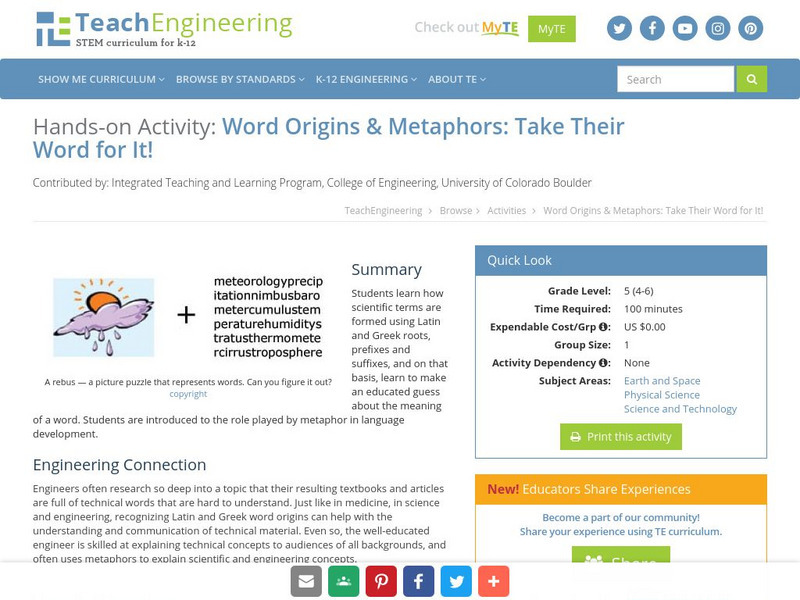Curated OER
Creature Feature
Young scholars make detailed observations and identify an unknown using descriptions. In this observation lesson students are given a creature and must be able to identify it by species and genus.
Curated OER
19c European Liberalism
If you'd like to prompt some great discussions in your history class, this presentation will surely get your class talking. Addressing 19th century liberalism in Europe (including influences from England, France, America, and Ireland),...
Curated OER
Things That Stick Out Or: How To Find Your Way Around on a Map
Learners explain the meaning of and recognize the map outlines of a peninsula, an isthmus, and a cape.
Curated OER
Weather Watchers
Students study basic meteorology concepts. They build a simple barometer to measure air pressure. They explore the concepts of relative humidity, air convection currents and temperature inversions and to discover their connection to...
Curated OER
Vocabulary of Ancient Rome Grades 9-12)
Students define ancient Roman vocabulary using the dictionary writing sentences.
Alabama Learning Exchange
Echolocation Stations: Exploring Sound
Fourth graders explore the concept of echolocation during a unit on whales. They listen to the book and watch the Reading Rainbow video for "Humphrey: The Wayward Whale," explore various websites, and conduct experiments to demonstrate...
Curated OER
Brown Bagging with Short Stories
Students participate in a study of short story elements, applying their knowledge and understanding to a selection of short stories. In this short stories lesson, students read five short story selections, identifying conflict,...
Curated OER
Centipede or Millipede?
Students discuss millipedes and centipedes in terms of their classification as arthropod. Using a diagram, students categorize and compare and contrast the characteristics of millipedes and centipedes based on their discussion of...
Curated OER
Life's Lessons: Survival of the Fittest
Students analyze Jack London's use of anthropomorphism to identify the importance of adaptability in life. In this literature lesson, students use the novel The Call of the Wild to identify key elements in survival. Students...
Curated OER
War and International Law: A Brief History of the Law of War
High schoolers investigate the history of the law of war. In this international law lesson, students listen to a lecture regarding the history of international law spanning from Pax Romana to Collective Security. High schoolers...
Curated OER
Name That Place: Cultural Place Names in the United States
Students examine the origin of the people that settled in the United States. In this United States History lesson, students work in small groups to complete several activities that explore early settlement, such as a worksheet, a...
Pennsylvania Department of Education
Storybooks and Games
Students explore stories, games and coloring pages on an interactive website. For this pre-reading activity, students have free access to stories, coloring pages and simple games at the Lil' Fingers website.
Curated OER
Short Stories: The Puzzle Pieces of Life
Students distinguish the elements of fiction in a short story. In this fiction elements lesson, students complete nine lessons of activities to learn about the elements of fiction in short stories.
University of Alberta
University of Alberta: Zoology Latin and Greek Roots Index
This University of Alberta site features Latin and Greek roots for zoological terms. The index is divided alphabetically.
Texas Education Agency
Texas Gateway: Understand New Vocabulary Using Roots and Affixes
Learn how to determine the meaning of grade-level academic English words derived from Latin, Greek, or other linguistic roots and affixes.
Texas Education Agency
Texas Gateway: Understand New Vocabulary Using Roots and Affixes
Determine the meaning of grade-level academic English words derived from Latin, Greek, or other linguistic roots and affixes.
Texas Education Agency
Texas Gateway: Understand New Vocabulary Using Roots and Affixes
Determine the meaning of grade-level academic English words derived from Latin, Greek, or other linguistic roots and affixes.
Education Development Center
Tv411: Vocabulary: Roots and Their Families
There are three activities in this lesson: 1) read root words and definitions, and type root into the box to complete the sentence; 2) drag root into box to complete the sentence; and 3) determine meaning of new word based on meaning of...
Reading Rockets
Reading Rockets: Reading Topics a to Z: Root Words, Roots, and Affixes
An introduction to using word parts to improve vocabulary skills. Includes charts of common Greek and Latin roots as well as common prefixes and suffixes and their meanings. Each of the four charts can be downloaded.
TeachEngineering
Teach Engineering: Take Their Word for It!
Students learn how scientific terms are formed using Latin and Greek roots, prefixes and suffixes, and on that basis, learn to make an educated guess about the meaning of a word. Students are introduced to the role played by metaphor in...
Utah Education Network
Uen: It's Greek to Me!
This lesson plan engages learners in vocabulary-building strategies related to Greek and Latin roots. Students will be given charts with Greek and Latin roots. Learners will practice combining different roots to form present-day English...
Utah Education Network
Uen: Greek and Latin Roots Introduction
During this mini-unit, students will learn common Greek and Latin roots. Several supplementary resources are provided for students' study beyond the lessons.
Virtual Salt
Virtual Salt: Word Roots and Prefixes
At this website, there is a large chart that "Contains some of the common roots and prefixes that make up the building blocks of numerous English words." Columns for roots/prefixes, meanings, and examples are included.
Education Development Center
Tv411: Tune in to Learning: More Roots and Their Families
Part 2 of a series of interactive exercises concerning word roots and vocabulary skills. Site initially explains vocabulary and word roots, then allows students to complete interactive exercises.























